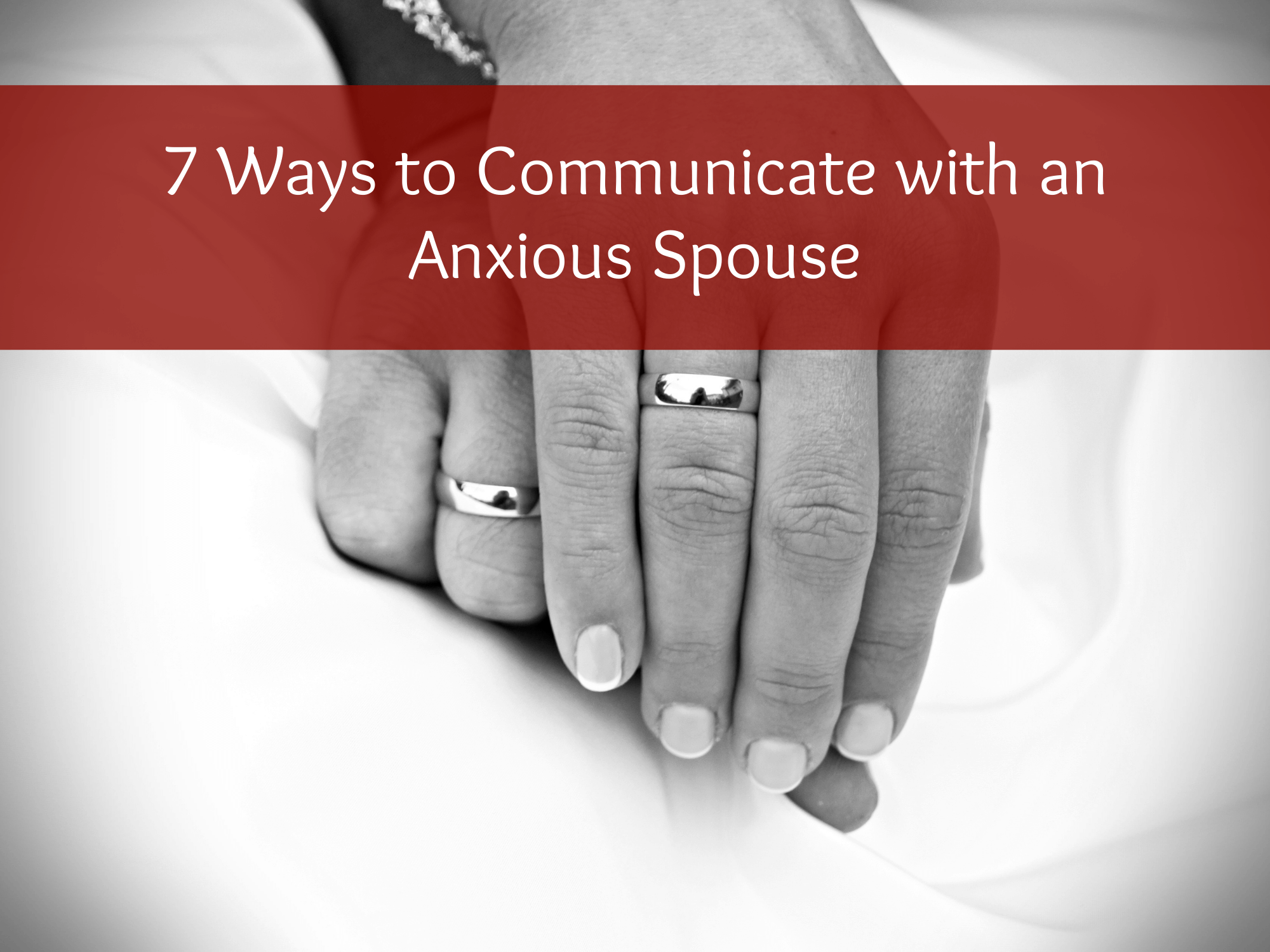Anxiety is a common mental health concern. In fact, according to the National Alliance on Mental Illness (NAMI), almost 20% of adults in the United States have an anxiety disorder.
Like other mental health conditions, anxiety affects all aspects of an individual’s life. This includes education, friendships, professional life, and, of course, intimate partner relationships.
When you’re in a long-term relationship or married to someone with anxiety, it can be challenging. There are many things to know in order to provide your partner the support they’ll need, and like any other relationship, challenges when learning to communicate effectively.

What is Anxiety?
At its most basic, anxiety is a “feeling of fear, dread, or uneasiness.” We all have anxiety at some points in our lives, especially during high-stress situations.
The difference between everyday anxiety and an anxiety disorder is the longevity and seriousness of symptoms. An anxiety disorder is when someone has “persistent, excessive fear or worry in situations that are not threatening.” Anxiety disorders disrupt thought patterns and often have physical effects alongside the mental and emotional symptoms.
There are four primary categories of anxiety disorders: General Anxiety Disorder (GAD), Social Anxiety Disorder or Social Phobia, Panic Disorders, and Obsessive-Compulsive Disorder (OCD).
Some individuals have high-functioning anxiety. These individuals may not always realize that their behaviors are problematic, and therefore don’t seek help or get an anxiety disorder diagnosis. They still face many of the same challenges as those with a medically diagnosed anxiety disorder.
No matter which type of anxiety an individual has, it presents challenges for being in a loving long-term relationship. When an individual is worried about almost everything, even things that aren’t a big deal, it can be hard for their significant other to approach them to have discussions and make decisions. Particularly if the anxious spouse doesn’t have strong coping skills.
One important note: Individuals with anxiety aren’t worrying intentionally. They don’t choose to be worried about things they know in their mind are fine – it’s a compulsion they can’t easily control. It takes time and a great deal of effort to be able to manage these thoughts, and even then it takes active effort, especially during stressful situations. They’re as frustrated about it as their partner.

7 Ways to Communicate When Your Spouse is Anxious
When your significant other is anxious, communicating with them may be tricky. They may be more irritable, more sensitive, or unopen to conversations about serious topics.
It may feel like a proverbial minefield to have even a simple conversation or make a decision together because you don’t want to upset them, but it seems like everything upsets them.
The good news is that there are strategies you can use to make communicating with your anxious spouse better and more effective during times of heightened anxiety.
Educate Yourself & Be Aware
The best thing you can do for yourself and your partner is to learn about their anxiety. Start by doing research from reputable websites and/or at the library. During times when your spouse is their usual self, you can also ask questions about the signs and specific things that trigger their anxiety. Many people who’ve been dealing with anxiety for any length of time will be able to give you insight about their unique worries and help you see when an anxious episode might be coming. When you’re aware of the signs and symptoms, it will be easier to tell when you need to adjust your communication style.
Be Patient
As difficult as it sometimes is, communicating with someone who’s in a highly anxious episode takes patience. Remind yourself that they’re not acting this way intentionally, and the best thing you can do for both of you is to remain calm. Getting frustrated and raising your voice or trying to get them to “snap out of it” will not be effective, and will likely cause a deeper spiral into anxiety – and take longer for them to become themselves again.
Avoid Inflammatory Topics
We all have topics that make us passionate. Some people like to debate, while others avoid conflict. We also have topics that cause instant stress. Many people worry about money, for instance. When your partner is feeling highly anxious, you should avoid bringing up these topics in general conversation. If a decision must be made, approach with patience and reassurance. If you can talk about it after they’re recovered from the anxious episode, do that. It will be better for everyone, including you.
Reassure Them
Coping with anxiety is difficult. It’s hard and uncomfortable to feel like your worry is out of control, even when your logical mind knows it won’t be like that forever. Time passes differently and everything feels heightened and more dramatic, even when it’s not. When your significant other is in the depths of their anxiety, it’s important to reassure them that you’re there for them, that you love them, and that everything will be okay. They may or may not seem receptive to this sentiment while they’re anxious, but it does help to feel like they’re not so alone.
Sit with Them as They Worry
Anxiety is messy. When someone is having an anxiety attack, or a panic attack, it’s scary for the individual, and can be frightening for their spouse, too. Even when the anxiety isn’t physical but you can tell your partner is miserably worried it’s painful to watch because there’s not a whole lot you can do about it. One thing you can do, though, is to sit with them. Be there, even if you’re not talking. Hold their hand or give them a hug if they’re comforted by that. Anxiety can feel isolating to the person experiencing it, but if you’re there supporting them, without expectations, it will remind them that the anxiety will pass.
Give Them Space if They Ask
During a time of high anxiety, not everyone wants to be around others. This can be especially true if the individual experiences mood swings and gets easily irritated or overwhelmed because they don’t want to take it out on others around them. For a spouse, this can feel challenging because you want to be there for them but they seemingly won’t let you. Giving them the space they need is a form of being present because it’s a sign you understand what they need and are willing to provide it.
Help Them Practice Coping Skills
One of the most common treatments for anxiety is therapy. During sessions, the individual will explore their anxiety and learn ways to manage and cope with it. When anxiety is high, you can help your spouse remember and practice these skills. Although they will be the one to work through the method, you can help them recall the steps and be a silent supporter, so to speak, while they calm down.

